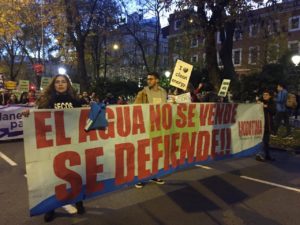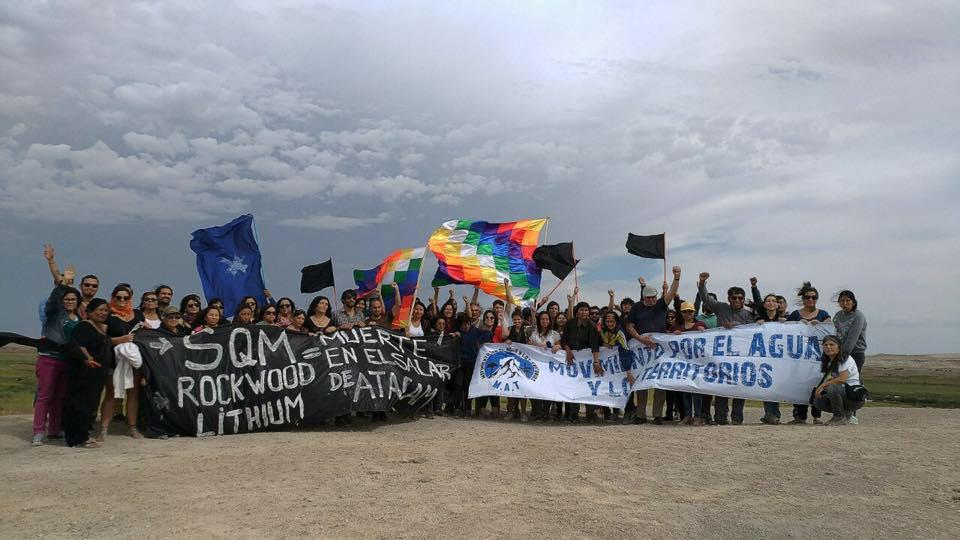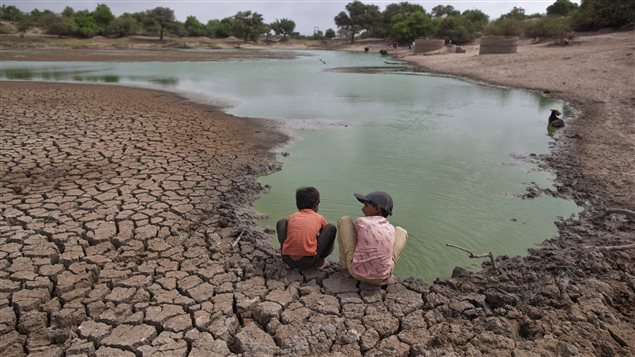Water in dispute: Chilean private property over the basis of life
On World Water Day, ChDI offers an article on the current state of property and future directions for equitable and sustainable use.
Sunday March 22, 2020
Alejandra Parra Muñoz[i]
We are water. Around 65% of the human body is made up of water. Everything we eat requires water for its development. The sea jellyfish is 99% water, while that fish is 65-80% water. The water content in plants is about 70%. In other words, water is not only vital for humans, it is vital for all living things on the planet.
Although three-quarters of the planet is covered by water, only 2% of is fresh water. From this 2%, a smaller percentage is available for human consumption. However, there has been an abundance of fresh water on the planet for tens of thousands of years. The existence of a stable climate, large extensions of forests, and a synergetic relationship between humanity and the environment, have led to the maintenance of these beneficial conditions for the life development. But since the industrial revolution half of the forests have been cut down and the atmosphere has been modified resulting that climate has undergone enormous changes. Today, seasons are blurred; the rains have been compressed in quantity and time, falling with greater intensity and less permanence, which does not allow the aquifers to be recharged. The increasing temperatures are melting glaciers which are the reserve of fresh water at drought times. In addition, the use of huge amounts of water for industrial and productive purposes is making water less available for human consumption and wildlife. Today, nearly 2 million people die each year due to lack of clean water, and it is likely that in the next 15 years half the world’s population will live in areas where there will not be enough water for consumption. Around one in ten people on planet – almost 800 million – do not have access to water sources, and the World Economic Forum and other institutions are estimating that on 2030 we will have over 40%of demand, which the planet will not be able to supply. [1]
Today, nearly 2 million people die each year due to lack of clean water, and it is likely that in the next 15 years half the world’s population will live in areas where there will not be enough water for consumption.

Modatima attends COP25 – Madrid 2019
In Chile, water is susceptible to privatization, and this has been the case since 1980 when during the civil-military dictatorship, the constitution that now governs this country was written down. Without a parliament and without constituents democratically selected, thus 11 people (only one woman of them) drafted the text which was signed later by the military junta. Despite of make-up adjustments during the government of Ricardo Lagos (except for the elimination of the appointed senators), currently the Political Constitution (CP) is the same of 1980s.
The Political Constitution of Chile (CP) in its article 19, paragraph 24, establishes: “The right of property in its various forms over all kinds of tangible or intangible property.” And at the end of this numeral, it states that “The individuals rights over waters, recognized or constituted in accordance with the law, shall grant their owners ownership over them“. Based on this article, the Water Code was promulgated in 1981 which regulates the uses, allocation and constitution of water rights. The Water Code establishes in its Article 5 that “waters are national goods for public use and private individuals have the right to use them”. On this right applies the provisions of paragraph 24 of Article 19 of the CP, giving its owners the property over them. Ownership of water rights implies that they are owner in perpetuity, can be traded, inherited, etc. In other words, water in Chile, once rights are established, becomes private property. And it is that “Dirección General de Aguas”[2] has the obligation to grant rights when its requests comply with the form. This is how today in Chile the human right to water, recognized by the UN in 2010, is not guaranteed, and the use of water to human consumption or subsistence, competes with both productive consumptive and non-consumptive uses.
This is how today in Chile the human right to water, recognized by the UN in 2010, is not guaranteed, and the use of water to human consumption or subsistence, competes with both productive consumptive and non-consumptive uses.
Consumptive rights are those rights constituted on water quantities that are consumed, and whose use is made without returning the water used to the channel from which it was extracted. Non-consumptive rights, on the other hand, are those where the water, after being used, must be returned to the channel from which was extracted. The latter are the rights constituted for hydroelectric purposes, which owner are mainly (close to 100%) private individuals, but also of foreign private individuals. Eighty percent of non-consumptive water rights belong to ENDESA, which at the same time belongs to Enel which is a transnational company headed by Hernán Chadwick Piñera. Nearly to 90% of the consumptive water rights are in the hands of mining and agro-export companies (MAT).
The popular approach to this problem has been the nationalization of water as a measure that would solve the injustice of the current water distribution. However, nationalization is an extremely imprecise tool that does not guarantee anything more that the administration of water belong to Chilean people. First of all, the word “nationalization” refers to Chilean nation, as Chile were a single and indivisible nation, erasing from the country’s maps the native peoples, who more than anyone else, have the right to use the water found in their territories. Assuming that “nationalization” in this context refers to nationalization, it also does not guarantee a fair distribution of this vital element.
Eighty percent of non-consumptive water rights belong to ENDESA, which at the same time belongs to Enel which is a transnational company headed by Hernán Chadwick Piñera. Nearly to 90% of the consumptive water rights are in the hands of mining and agro-export companies (MAT).
In Ecuador and Bolivia, where progressive governments have nationalized strategic natural commons such as minerals and hydrocarbons, only to exercise neo-extractivism. The local communities that lives in territories where these goods are extracted continue to suffer the consequences of global economic system that puts Latin American countries in the category of “underdeveloped” or “developing”, with the function of delivering raw materials to the countries that created those categories, to sustain their unsustainable development with our natural commons. At the same time, crush the original peoples materially and culturally as archaic. There is no longer an attempt to Christianize, but today there is an attempt to modernize the indigenous, to convince them (and us) that their livelihood are not acceptable, that they should embrace the way developed countries like the only acceptable way of living. Even though that is the cause of global warming, perhaps the greatest environmental catastrophe that humanity will ever both face and threatens the survival of all peoples in Earth.
However, thanks to the life forms of the original peoples, we have not destroyed the nature of planet. Native peoples have a special relationship with we call nature in Western culture. The western concept of nature implies a separation between the human and wildlife. On the other hand, for indigenous peoples there is not this division, and their societies are part of they call “pachamama” (Andean peoples), “ñuke mapu” (Mapuche people), and hundreds of other denominations that show the relationship of reciprocity, respect and dependence of indigenous peoples with their environment. Their austere lifestyles, based on the natural assets of their environment, their technologies with low energy consumption and adapted to their own needs, mean that indigenous peoples maintain lifestyles, instead of destroy the conditions of the environment, protect them, because of their lives depend on that. If all inhabitants of the planet live in this way, the ecosystems could be recovered and returned to healthy states . Instead, it requires four Earth planets to have enough common natural goods for all the world’s population, thus, to reach the levels of material comfort that developed countries to enjoy. Therefore, the promise of development for the entire planet is impossible to fulfill.
the word “nationalization” refers to Chilean nation, as Chile were a single and indivisible nation, erasing from the country’s maps the native peoples
Water is a sacred good for indigenous people, and rightly so. For Mapuche people, water has spirits that protect it and punish those who do not respect it. For Mapuche people, water has discernment and therefore has rights. Nature has rights. This is a concept that, should be introduce into the discussion of new CP, thus could guide us towards deeper levels of understanding and respect for the territories, in other word, for all life forms that are developing in the territories, not only human life, but all living beings and their relationships with the inert environment (inert for Western culture).

Movement for water and territories in Chile (MAT)
During 2019, the Movement for Waters and Territories (MAT) implemented dozens of water council, where they discussed how water should be distributed in the country. All the participants agreed on one thing: it is not possible that water continues to be a good that can be privatized. We need other ways of distributing it, ways that not only guarantee water for survival and human consumption, but also for the development and flourishing of wildlife. Community management of water is one of the concepts that has emerged repeatedly, and which will have to be work in depth within the discussions. Therefore, we will be addressed it in the constituent process that Chile clearly face today.
Their austere lifestyles, based on the natural assets of their environment, their technologies with low energy consumption and adapted to their own needs, mean that indigenous peoples maintain lifestyles, instead of destroy the conditions of the environment, protect them, because of their lives depend on that
The rights of nature lead us to a discussion in-depth such as, political, technical and spiritual terms. In the context of decolonizing key, this discussion could lead us to levels of environmental and social justice never seen in Chile. Let us begin by moving forward there as peoples who share this long and diverse territory.
REFERENCES
[1] https://www.bbc.com/mundo/noticias/2014/08/140821_tierra_agua_escasez_finde_dv
[2] State agency that is responsible for managing, verifying and disseminating the country’s water information.
______
[i] Master of Planning, University of Otago. Biologist in Natural Resources Management. Member of the Environmental Rights Action Network RADA.

